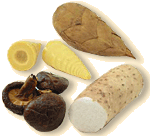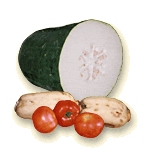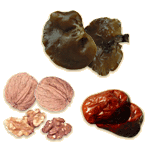Why different foods are consumed each season and what are their health benefits?
 |
| Pulse taking |
According to Traditional Chinese Medicine (TCM), the world is a harmonious and holistic entity where all living beings are viewed in relation to the surrounding environment. Since ancient times, the Chinese have tried to explain different complicated phenomena by creating yin yang or the five elements theories. Man is part of the holistic entity, and takes his cue from nature. He is influenced directly and indirectly by changes in weather and needs to make corresponding physiological and pathological responses. For example, a change of season causes the rate, rhythm, volume and tension of the pulse to vary. The pulse tends to be taut in spring, full in summer, floating in autumn, and sunken in winter. TCM physicians will take this into account when distinguishing the abnormal pulse from the normal. The occurrence, development and change in the pattern of many diseases are seasonal such as wenbing occurring in spring, sun strokes in summer, dryness-related symptoms in autumn, and cold stroke syndromes in winter.
However, we can take active measures to prevent disease and maintain good health. One common method is to consume different foods according to the season. The Chinese widely believe that we are what we eat, and most dietary guidelines follow on from nature. According to TCM philosophies, if we imbibe seasonal foods that are similar in nature to the external environment, we remain in harmony with the environment, adapt better to changes in season and stay healthy. The basic applying principle is "nourishing yang in spring and summer time, and nourishing yin in autumn and winter time." The ancient Chinese realized that in accordance with seasonal changes, yang qi tends to flow outwards and occupies the body surface in spring and summer and therefore, the innards get relatively depleted of yang qi and need replenishing. At the same time, the weather in autumn and winter is cold and dry, and it is important to keep warm and prevent dryness. Through the methods of replenishing yin and nourishing dryness, TCM believes it is a way to build up energy and prepare for the coming seasons.
According to TCM health opinion, what is the dietary advice in each season?
Spring
 |
| Spring foods: Chinese yam, bamboo shoot and mushrooms. |
Spring is the season of new birth and new growth. According to TCM, spring belongs to the wood element and dominates liver functioning. If we don’t adapt to the changing climate in spring, we may susceptible to seasonal health problems, such as flu, pneumonia, or a relapse of chronic diseases. It is advisable to reduce the intake of sour flavors and increase sweet and pungent flavors as this facilitates the liver to regulate the qi (vital energy) throughout the body. Examples of recommended foods for the spring include onions, leeks, leaf mustard, Chinese yam, wheat, dates, cilantro, mushrooms, spinach and bamboo shoots. Fresh green and leafy vegetables should also be included in meals; sprouts from seeds are also valuable. In addition, uncooked, frozen and fried foods should only be taken in moderation since these are harmful to the spleen and stomach if consumed in large amounts. As cold winter keeps us indoors and tends to make us eat too much, people may develop a heat balance in the spring, which leads to dry throats, bad breath, constipation, thick tongue coating and yellowish urine. Foods like bananas, pears, water chestnuts, sugar cane, celery and cucumber help to clear the excessive heat.
 |
| Summer foods: tomato, wax gourd and lotus root. |
Summer
Plants grow fast in summer. People act energetically, and the body’s qi and blood become relatively more vigorous than in other seasons. TCM claims that the physiological changes make the heart over-function, and there is too much yang qi flows outward to the exterior part of the body. According to the five elements theory, an over-functioning heart restricts the lung functioning, it is advisable to eat more food with pungent flavors and reduce bitter flavors; this enhances the lung and maintains the normal sweating mechanism in summer. Sweat is the fluid of the heart; excessive sweating scatters heart-qi and weakens the mind causing symptoms like being easily annoyed, low spirit, restless and sleeping difficulties. Foods with sour and salty flavors help to ease these symptoms. Summer is hot and rainy in some regions, which disturb the fluid and electrolyte balance of the body and lead to lethargy, weakness, fever, thirst, lack of appetite and possibly loose bowels. Some foods are recommended for keeping the body cool and balanced, such as bitter gourd, watermelon, strawberries, tomatoes, mung beans, cucumber, wax gourd, lotus root, lotus seed, Job’s tears, bean sprouts, duck and fish. In general, the daily diet should contain more vegetables and fruit at this time so as to stimulate the appetite and provide adequate fluids. Warm and cooked foods ensure the digestive system work more effectively; too many greasy, raw and frozen foods can damage the digestive system and lead to a poor appetite, diarrhea or stomach upset. It is a Chinese tradition in summer to make soups for clearing summer heat, eliminating dampness and promoting digestion.
Autumn
 |
| Autumn foods: pineapple, pear and white fungus |
Things begin to fall and mature in autumn. TCM believes that autumn correlates with the lung system, which dominates the skin, respiration, body fluids metabolism, blood circulation, immunity and melancholy emotion. Since the vigorous summer has over, TCM holds that everything needs to turn inwards so as to prepare for the harsh winter. Foods are important to ensure that the body adjusts to the changing seasons. The dry weather usually causes an itchy throat, a dry nose, chapped lips, rough skin, hair loss and dry stools. We need to eat to promote the production of body fluids and their lubricating effects throughout the body. Beneficial foods for this are lily bulb, white fungus, nuts or seeds, pear, lotus root, pumpkin, honey, soy milk and dairy products. It is advisable to eat more food with sour flavors and reduce pungent flavors as such things like onion, ginger and peppers induce perspiration, while sour foods like pineapple, apple, grapefruit and lemon have astringent properties and thus prevent the loss of body fluids. The body needs extra fluids to counteract the dry environment, and it is a Chinese tradition to eat porridge for breakfast and soup for dinner that is made with the above ingredients.
 |
| Winter foods: Chinese dates, black fungus and walnuts. |
Winter
In winter, living things slow down to save energy while some animals hibernate. It is also the season where humans conserve energy and build strength as a prelude to spring. TCM believes our diet should be adapted to focus on enriching yin and subduing yang, which mean we should consume appropriate fats and high protein foods. Mutton, beef, goose, duck, eggs, rabbit meat, Chinese yam, sesame, glutinous rice, dates, longan, black fungus, bamboo shoot, mushrooms, leek and nuts are common ingredients in the Chinese dishes this time. Winter corresponds to the kidney system according to the five elements theory; hyperactive kidney inhibits the heart which leads to palpitations, cardiac pain, limb coldness and fatigue. It is advisable to eat more food with bitter flavors while reducing salty flavors so as to promote a healthy heart and reduce the workload of the kidney. Foods with bitter flavors include apricot, asparagus, celery, coffee, tea, grapefruit, hops, kohlrabi, lettuce, radish leaves, kale, vinegar and wine. Some people may eat too many hotpots or high calory foods causing excessive heat to accumulate in the lungs and stomach. They may experience problems such as bronchitis, sore throats, peptic ulcers and skin problems, thus it is necessary to balance with certain amount of cool dishes and water in winter. Winter is also a good time to boost the natural constitution of the body and improve symptoms associated with chronic conditions. Since a person’s appetite tends to increase over winter when they have a lower metabolic rate, absorbed nutrients from foods can be stored more easily. Energizing herbs such as ginseng, wolfberry, angelica, rhemannia root, astragalus and medicinal mushrooms can be used for this purpose. It is a trend for Chinese restaurants to prepare various medicinal courses using these ingredients.
The principle of harmony between food and the weather is based on practical experience. It may seem to contradict principles stated elsewhere but the fact remains: foods eaten during the four seasons have different impacts on the human body. Foods become part of the body after being consumed but the four seasons (that is environmental factors) always impacts externally on the body. Chinese dietary philosophy suggests that you embrace your native foods in addition to eating locally-grown foods and those in season. What is unhealthy about the modern diet is that particular foods are now available all year long and may be chemically treated instead of being grown naturally and being only available at a certain time. Natural, home-grown and chemical-free products are the most nutritious foods.
References
| 1. |
Chinese System of Food Cures Prevention & Remedies by Henry C. Lu.Sterling Publishing Co., Inc. 1986. |
| 2. |
張恩勤主編, 《中醫基礎理論》上冊, 上海中醫藥大學出版社1990.
Basic Theory of TCM (I) by Zhang Enqin. Publishing House of Shanghai University of TCM. 1990. |
| 3. |
方羽主編《四季養生叢書.春季養生》,科圖有限公司,2000年11月.
Seasonal Health Perservation Series-Health Perservation in Spring, HK Ke Hua Books Publishing Co. Ltd. 2001-11. |
| 4. |
方羽主編《四季養生叢書.夏季養生》,科圖有限公司,2000年11月.
Seasonal Health Perservation Series-Health Perservation in Summer, HK Ke Hua Books Publishing Co. Ltd. 2001-11. |
| 5. |
方羽主編《四季養生叢書.秋季養生》,科圖有限公司,2000年11月.
Seasonal Health Perservation Series - Health Perservation in Autumn, HK Ke Hua Books Publishing Co. Ltd. 2001-11. |
| 6. |
方羽主編《四季養生叢書.冬季養生》,科圖有限公司,2000年11月.
Seasonal Health Perservation Series - Health Perservation in Winter, HK Ke Hua Books Publishing Co. Ltd. 2001-11. |
| |
|
| Written By: |
| Dang Yi (黨毅) MD PhD |
| Professor, Beijing University of Chinese Medicine; Visiting Professor, Middlesex |
| University, London, UK; Vice Director, Gourmet Food Institute of Health Care and Nutrition of Beijing, PRC. |
| |
| Editors: |
| Angela Collingwood MSN, Integrated Chinese Medicine Holdings Ltd. |
| Raka Dewan, Integrated Chinese Medicine Holdings Ltd. |
| Rose Tse, Integrated Chinese Medicine Holdings Ltd. |
Special thanks to Elpidio Talens Juan for helping with article graphics. |